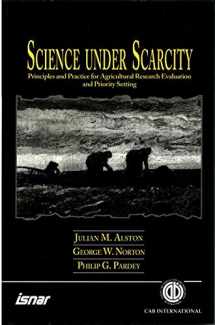
Science Under Scarcity: Principles and Practice for Agricultural Research and Priority Setting (Cabi)
Book details
Summary
Description
Resources for agricultural science are scarce across the world. Yet even as resources are shrinking, agricultural science has expanded its inquiry into many new areas - such as environmental preservation, food quality, and rural development - without forsaking its more traditional concerns. In a time of tight government budgets, research administrators are faced with the need to provide strong evidence that costs are justified by benefits. Science under Scarcity is an invaluable guide to the theory and methods necessary for evaluating research in agriculture and for setting priorities for resource allocation. Although economists have made significant progress in developing more sophisticated methods for research evaluation and priority setting, many research analysts and administrators do not have a working knowledge of those practices. Without the assistance of formal economic analysis it is particularly difficult to assess the social value of new technologies or to make informed judgements about the trade-offs that are involved in allocation decisions. Addressing that knowledge gap, this book reviews, synthesizes, and extends such methods as economic surplus analysis, econometric techniques, mathematical programming procedures, and scoring models. It discusses these practices in the context of scientific policy, describes their conceptual foundations, and explains how to do them.
Originally published in 1995 in hardcover by Cornell University Press, it is now reissued in paperback by CAB INTERNATIONAL.


We would LOVE it if you could help us and other readers by reviewing the book
Book review



